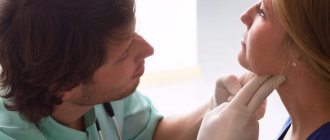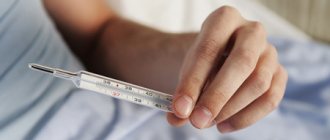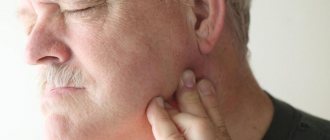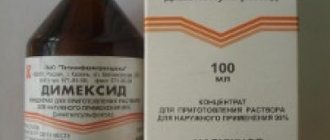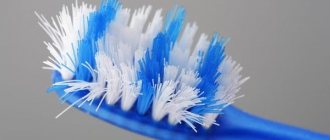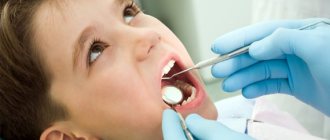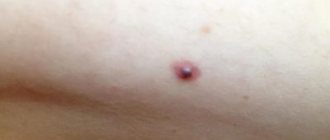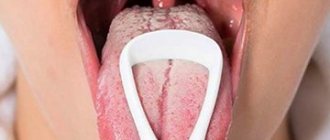Anything can lead to such inflammation: serious pathologies or simple overwork. But most often, enlarged lymph nodes under the jaw signal problems with teeth or ENT organs. To improve the patient’s condition, these problems must first be eliminated - and the lymph nodes will return to normal over time.
If after recovery the submandibular lymph nodes are still enlarged, then the cause is associated with more serious diseases. In this case, a complete diagnosis and well-chosen comprehensive treatment will be required.
Lymph nodes: what role do they play in the body?
The submandibular lymph nodes are responsible for the safety of the nose, throat, ears, and teeth. They act as a kind of filter in the body. It is through them that lymphatic fluid flows - the basis of the immune system. When the activity of harmful bacteria increases, the filters react instantly: they release lymphocytes to destroy the pathogenic flora.
Experts have found that the adult body contains about two liters of lymph and more than four hundred nodes. Most of them are found under the arms, on the neck, head and groin. Each is responsible for a nearby organ or tissue cells that are located nearby.
Signs of pathology
If there is no pathology and the person is healthy, then the lymph nodes are quite difficult to palpate. But if there are problems in the body, their condition changes. At first, the inflamed areas only swell slightly and increase in size, which becomes noticeable upon palpation. The pathology is not accompanied by any other signs at the initial stages.
If, due to dental problems or after tooth extraction, the lymph node hurts, then it means that the person has started the underlying disease, against which he may have developed lymphadenitis. What is this? This is just inflammation of the lymph nodes. Let us list the symptoms of the pathology.
- Swelling and enlargement of the areas under the jaw, chin and neck. When you feel them, you can find lumps and even lumps. In rare cases, the lymph node behind the ear may also increase in size, for example, if there are eruption pathologies or complications arise after the removal of a wisdom tooth.
- Discomfort when opening the mouth, chewing and swallowing food, when swallowing saliva and drinking liquids (soups, drinks). Pain when pressing on inflamed and enlarged areas. In later stages of the disease, pain can spread to the neck, head, and radiate to the jaw and throat.
- Increased body temperature. The more the disease progresses, the higher the temperature. The thermometer can reach 40°C.
- The appearance of general malaise and weakness, chills, insomnia.
How to determine inflammation of the jaw lymph node
For inflammation of the submandibular lymph nodes, treatment should not only be symptomatic, but also aimed at eliminating the preconditions that led to the development of the disease. To determine them, a thorough diagnosis is carried out, with the help of which it is possible to either identify or exclude serious infectious diseases.
Inflammation of the lymph nodes is called lymphadenitis. The disease occurs spontaneously and has three stages of development. Signs of the disease appear in the following order:
The first stage is characterized by enlarged nodes and pain on palpation. Inflammation of the lymph node under the jaw is accompanied by insomnia, headache, chronic fatigue, and fever.- The second stage (see photo) is acute and clearly expressed in appearance: the tumor is visible even without palpation. The movement of the jaw is limited, severe pain appears, the temperature rises, and suppuration forms.
- Third stage. The pain spreads to other areas: neck, collarbones, armpits. Inflammation of the nerves of the teeth and throat is observed.
When an enlargement of the submandibular lymph nodes occurs, the first thing to do is visit a doctor. You cannot self-medicate. But it is possible to suggest the cause of the disease. For example, the round shape of the compaction indicates the presence of diseases of the ENT organs . With such ailments, the lymph node remains mobile.
If the lymph node on the neck on the left under the jaw hurts, then the source of inflammation is nearby. Lymphadenitis, which can develop as a result of mechanical damage to the tissues of the node itself, cannot be excluded.
To eliminate inflammation, the patient will need to see an otolaryngologist. He will ask the patient to undergo a series of tests:
- ultrasound diagnostics;
- blood tests;
- laboratory research on bacterial genomes;
- fluorographic diagnostics;
- tests for reactive protein and others.
An ENT doctor can refer the patient to other specialists to detect other diseases: a pulmonologist, hematologist, infectious disease specialist, oncologist, dentist, immunologist.
Treatment of submandibular lymphadenitis
How to treat inflamed lymph nodes and whether it is necessary at all, only a doctor can tell after an examination. There are three cases that end with lymphadenitis.
When the disease is mild, being a symptom of some disease, treatment specifically for submandibular lymphadenitis is not required. The main thing is to cure the underlying disease, after which the lymph nodes themselves will shrink.
In order to reduce pain, you can drink ginger tea, apply heat to your throat, drink Lymphomyazot for a while - drops that strengthen the immune system, or another similar drug.
If the disease has become more complicated, sometimes antibiotics cannot be avoided; in the worst cases, treatment involves surgery to open the node and pump out the pus that has formed there.
Submandibular lymph nodes are indicators of the condition of teeth and ENT organs, so their enlargement should not be ignored.
Observations of patients have shown that the size of enlarged lymph nodes is directly related to the cause of the disease. For example, tumors usually lead to a significant change in the diameter of the organs of the lymphatic system. Moreover, treatment of such patients is effective only in 1 case out of 5. Therefore, it is so important, as soon as you feel pain in the submandibular lymph nodes, to consult a doctor. He will be able to make an accurate diagnosis and prescribe gentle but effective treatment.
Why do the lymph nodes under the jaw hurt?
The patient himself can, with the help of simple palpation, determine whether the lymph node under the jaw has enlarged or not. After all, inflammation does not always occur with pronounced symptoms. Much depends on the type and severity of the infection in the body.
After detecting a compacted, enlarged node, you must visit a doctor. Before going to the clinic, you need to prepare answers to the questions that the specialist will ask in order to conduct a competent diagnosis:
Remember if there were any injuries in the near future in the area where the neck was swollen, or if you received blows in this place. If it is a bruise, then the injury will resolve in the near future.- Remember what dosage forms you were treated with. Some drugs provoke this kind of inflammation. Such tablets include drugs that are prescribed to patients with epilepsy, vaccines against typhoid fever and some others.
When the lymph nodes under the jaw hurt when pressed, the cause of the phenomenon may lie in the fact that the patient has a serious pathology. If the node has increased in diameter by one and a half times, then the immune system itself is not able to cope with the inflammatory process in the body - outside help is needed.
If a node is detected, which after some time becomes soft to the touch, the patient needs treatment with antibacterial drugs. This may indicate that the lymph node was unable to resist the inflammatory process and allowed the infection to spread further throughout the body.
Inflammation of the lymph nodes under the jaw: causes
Inflammation of the lymph nodes is called lymphadenitis. As mentioned earlier, this condition is a reaction of the immune system to damage to the body by microbes and viruses.
If treatment is untimely, phlegmon develops, the severe form of which ends in sepsis. Therefore, it is not recommended to self-medicate.
Most often, the root cause of lymphadenitis is infection. In childhood, the inflammatory process is much more complex: with high body temperature and pain. Adults tolerate the disease more easily. Enlarged lymph nodes always occur accompanied by a number of diseases , these include: tonsillitis, pharyngitis, otitis media, pulpitis, laryngitis, caries, frontal sinusitis, sinusitis.
Another cause of inflammation of the submandibular lymph nodes is acute respiratory diseases and influenza. The process indicates excellent functioning of the immune system. Such ailments are characterized by symptoms indicating that lymphocytes are actively fighting viruses and infections.
- weakness, elevated body temperature;
- migraine;
- irritation of the nasal mucosa, throat;
- body aches.
Enlarged lymph nodes occur with AIDS, genitourinary infections, and syphilis. Only with such pathologies, not only the submandibular nodules increase.
Systemic disorders of the immune system also provoke disease of the lymphatic system. This is when there are sluggish inflammatory processes in the body:
- rheumatism;
- serum pathology;
- lupus erythematosus;
- Infectious mononucleosis.
With mumps (see photo), infection in the oral cavity, swelling of the nodes on the left or right under the jaw is observed. Depending on which side of the jaw glands is inflamed. If the right (left) is swollen, this is a sign of infection of the right (left) salivary gland. This condition is accompanied by an inflammatory process and swelling in the cervical area. When pressed, the submandibular lymph nodes have a solid base.
Disruption of the lymphoid system occurs in dental ailments:
- Caries leads to manifestations of purulent abscesses that develop near the root of the tooth, this condition causes swelling of the gums. As a result, the nodes become inflamed. If the infection is in the mouth on the right, then in this part they increase. And removing the tooth will solve the problem.
- If wisdom teeth grow in an adult, then the lymphoid system instantly reacts to the process.
- After tooth extraction with complications, this system also perceives the process as a threat to the immune system. After the gums heal, everything will return to normal.
- Periodontal disease, stomatitis, cysts, tartar, which contribute to the development of periodontitis, negatively affect lymph exchange.
Tumors of various etiologies also contribute to the development of lymphadenitis. If you suspect a malignant neoplasm, do not self-medicate at home, do not heat or massage them. You need to urgently contact specialists.
Structural features and main functions
The main task performed by the lymphatic system is to filter plasma from pathogens that penetrate inside from the external environment.
Lymph nodes are located in small groups, which can be easily felt during palpation. Single lymph capsules can also be found in the body.
In the normal state, when everything is in order in the body, the size of the lymph capsules does not exceed 0.5 cm. Visually, they are indistinguishable and are located on the vascular structures responsible for the flow of lymph. This liquid performs essential functions and is intended to maintain immune protection.
Show photo
If an infection enters the human body, then all the forces of the lymphatic system are activated to fight it. The production of additional lymph is activated, which causes an increase in lymph capsules in size. When they increase and pain develops, we are talking about an inflammatory process.
No measures should be taken to return these structures to their previous state. First of all, it is necessary to find out and eliminate the cause of the changes occurring in the body, and only after that, if the condition of the lymph nodes does not recover, carry out symptomatic therapy.
What to do if the lymph node under the jaw is inflamed
First, determine what is the source of the pathology. Please note that treatment at home may not be effective. And some traditional methods of treatment are sometimes dangerous. You should not heat the lymph nodes when they are inflamed , or use infusions from plants if the etiology is unknown.
Doctors do not recommend treating inflammation of the lymph nodes under the jaw at home, because it is difficult to cure the pathology if you do not know the exact diagnosis. And a regular massage of the lower submandibular point threatens to worsen the patient’s condition. Blood poisoning may even occur due to further spread of the infection.
If the lymph node under the jaw hurts when pressed, you only need to do one thing - go to the dentist. Especially when the gums in the mouth become inflamed, such symptoms indicate tooth decay or complications that may arise after a person has had a tooth removed. As a result of dental treatment, all symptoms of the disease will disappear. The same thing will happen when all inflammation of the ENT organs is eliminated, the wisdom tooth grows in, or the flu or ARVI passes.
If the lymph nodes under the jaw are inflamed due to bacterial damage, treatment of the disease must be carried out comprehensively. After contacting a specialist doctor, the patient will receive recommendations. Only first will the doctor establish the nature of the disease, having received the results of an examination of nearby tissues and organs. You will need to take antibiotics at home. What type of drugs to use will become clear after a culture test. Most often, doctors prescribe broad-spectrum antibiotics.
If the lymph node under the jaw is inflamed due to an allergic reaction, it will have to be treated with antihistamines. It also wouldn’t hurt to see an allergist. He will be able to determine what or who is the irritant, and physiotherapeutic procedures will also be prescribed for a speedy recovery.
Treatment options
What to do when the submandibular lymph node on the left hurts:
- consult a doctor immediately;
- undergo prescribed studies;
- follow the prescribed treatment and doctor’s recommendations.
When discomfort is caused by ARVI and other pathologies of viral origin, symptomatic treatment is carried out. The doctor prescribes antiviral, anti-inflammatory, and antihistamine drugs. Local remedies include Acyclovir in the form of an ointment. For mononucleosis, the patient is advised to take interferon-based medications.
If pain under the jaw on the left side is caused by an allergic reaction, treatment includes taking antihistamines. An important condition for therapy will be to avoid contact with allergens.
What not to do if there is pain, inflammation or hardening of the left-sided submandibular node:
- independently choose antibiotics for treatment;
- warm the neck, apply hot compresses;
- massage the neck to relieve pain;
- take a hot bath during an acute period of inflammation;
- lubricate with bactericidal ointments;
- use traditional methods without the consent of a doctor.
At elevated body temperatures, bed rest is indicated. The patient should stay in a warm but well-ventilated room, drink plenty of clean water, eliminate heavy foods from the diet and add more vegetables and fruits.
In addition to taking medications, if you have aching, nagging pain under the jaw on the left, it is important to strengthen your immune system, regardless of the true cause of the disorder. For this purpose, piercing, taking vitamin complexes, switching to a healthy diet, and giving up bad habits are suitable.
Source: prolimfouzly.ru
What to do to ensure that the lymph node under the jaw never hurts
Each patient himself is able to prevent inflammation of the lymph nodes of the lower jaw. To do this, it is necessary to apply preventive measures. Their main task is to take care of their health.
- When it's cold outside, wear clothes appropriate for the weather. Otherwise, you risk hypothermia, which will subsequently provoke a cold. Which will lead to unpleasant consequences.
- Strengthen your immune system. Carry out gradual hardening, consume natural vitamin forms (fruits, vegetables), add aloe, honey, and echinacea to your diet. Be sure to play sports.
- Do not walk in cold weather without scarves and hats. An ordinary cold wind can become a source of inflammation of the lymphoid system.
- Treat caries in a timely manner, do not ignore the disease. If you do have a tooth removed, then follow all the dentist’s recommendations for healing your gums so that an abscess does not develop.
- Do not cause ENT infections; they also provoke inflammation of the nodes.
Do not ignore the body's signals that infectious diseases are attacking it. After all, this is how you trigger the disease and weaken the immune system. Therefore, at the first signs of illness, consult a doctor.
How to palpate the submandibular lymph nodes in the neck: location and photo
The study begins with the submandibular region. The location of the submandibular lymph nodes is such that they collect lymph from the mouth, lips, nose, cheeks and chin.
Along the midline of the chin region, the second or third finger examines the mental (submental) lymph nodes in the neck, the location of which is determined between the internal legs of the digastric muscle (m. digastricus). To study the right submandibular (submandibular) lymph nodes (located in the sublingual triangle, bounded by the edge of the lower jaw and both bellies of the digastric muscle), the right palm is placed on the head, slightly tilting it in the appropriate direction, and 3 fingers (II, III and IV) of the left hand placed under the edge of the lower jaw. In most cases, it is possible to remove the lymph nodes and grasp them between the fingers and thumb. The maxillary (retromandibular) lymph nodes are palpated in the space between the ascending edge of the lower jaw and the inner edge of the sternocleidomastoid muscle. Before palpating the lymph nodes in the neck, the throat and mouth should be examined to determine the potential source of infection.
Look at the location of the lymph nodes in the neck in the photo, which shows the places for their palpation and assessment of their condition:
